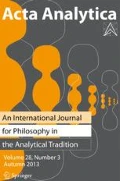Abstract
In this paper I defend epistemic circularity by arguing that the “No Self-Support” principle (NSS) is false. This principle, ultimately due to Fumerton (1995), states that one cannot acquire a justified belief in the reliability of a source of belief by trusting that very source. I argue that NSS has the skeptical consequence that the trustworthiness of all of our sources ultimately depends upon the trustworthiness of certain fundamental sources – sources that we cannot justifiably believe to be reliable. This is a problem, I claim, because if the trustworthiness of all of our sources depends upon sources that we should not believe to be reliable, then a reflective individual should not trust any of his sources at all. The hidden cost of rejecting epistemic circularity is thus the unacceptable skeptical thesis that reflective individuals like you and I have no justified beliefs whatsoever.
Similar content being viewed by others
Notes
Bergmann’s version of the principle applies not only to justification, but to all epistemic properties, such as knowledge and warrant. Interpreting “EPn” as referring to a belief exemplifying some epistemic property Epn, the principle is:
“One cannot obtain an EPn-belief (for example, a justified or warranted belief) that a belief source S is trustworthy by relying even in part on source S” (2000, 168).
Bergmann (2004) and (2009) and Pryor (2004) are clear examples of defenders of epistemic circularity who attempt to accommodate the intuition that one cannot acquire a justified belief by way of epistemically circular arguments. Bergmann (2004) argues that if one has doubts about the source in question, then the justification provided by one’s epistemically circular reasoning is defeated. [Bergmann (2009) modifies (2004) by arguing that such defeat may also occur if one ought to doubt the source.] Pryor (2004) claims that while one’s doubts about the reliability of the source in question do not defeat the justification provided by the epistemically circular reasoning, they nonetheless make the belief irrational.
For simplicity’s sake, and where the context makes the use sufficiently clear, in what follows I will use “source” to refer to our sources of justified beliefs.
See BonJour (1998, 203-16) for an example of an abductive defense of induction.
The formal way of stating R is that the relation is surjective. Recall that R holds that a normal human being is capable of being fully reflective. This amounts to the claim that for a normal human being, every source of justified belief has some supporting source. But this in turn is equivalent to the claim that when the domain is the sources of justified belief of a normal human, the relation is surjective. For a relation R is surjective in a domain insofar as for every object X, there is some object Y such that Y stands in relation R to X. This is exactly what R says: when the domain is the sources of justified belief of a normal human being, for every source there must be some supporting source.
For more on justified inconsistent beliefs, see Foley (1979).
Since Ida would not be capable of justifiably believing that any of her sources are reliable, she would then qualify as a kind of unreflective individual. This is where the distinction between being doxastically and epistemically unreflective becomes important. Ida is capable of forming beliefs about the reliability of her sources, and thus is doxastically reflective. But since she is incapable of forming justified beliefs about the reliability of her sources, she is not epistemically reflective.
References
Alston, W. (1993). The reliability of sense perception. Ithaca: Cornell University Press.
Bergmann, M. (2000). Externalism and skepticism. The Philosophical Review, 109(2), 159–194.
Bergmann, M. (2004). Epistemic circularity: malignant and benign. Philosophy and Phenomenological Research, 69(3), 709–727.
Bergmann, M. (2009). Justification without awareness. Oxford: Oxford University Press.
BonJour, L. (1998). In defense of pure reason. Cambridge: Cambridge University Press.
Cohen, S. (2002). Basic knowledge and the problem of easy knowledge. Philosophy and Phenomenological Research, 65(2), 309–329.
Foley, R. (1979). Justified inconsistent beliefs. American Philosophical Quarterly, 16(4), 247–258.
Fumerton, R. (1995). Metaepistemology and skepticism. London: Rowman and Littlefield.
Pryor, J. (2004). What’s wrong with Moore’s argument? Philosophical Issues, 14, 349–378.
Vogel, J. (2000). Reliabilism leveled. The Journal of Philosophy, 97(11), 602–623.
Vogel, J. (2008). Epistemic bootstrapping. The Journal of Philosophy, 105(9), 518–539.
Acknowledgements
Thanks to Laurence BonJour, Bill Talbott, Arthur Fine and Ann Baker for extensive discussion on this topic, and to audiences at Northern Illinois University and Iowa State University for their comments on an earlier version of this paper. I am also grateful to an anonymous referee of Acta Analytica for comments that helped to clarify the central argument in this paper.
Author information
Authors and Affiliations
Corresponding author
Rights and permissions
About this article
Cite this article
Alexander, D. In Defense of Epistemic Circularity. Acta Anal 26, 223–241 (2011). https://doi.org/10.1007/s12136-010-0100-2
Received:
Accepted:
Published:
Issue Date:
DOI: https://doi.org/10.1007/s12136-010-0100-2




